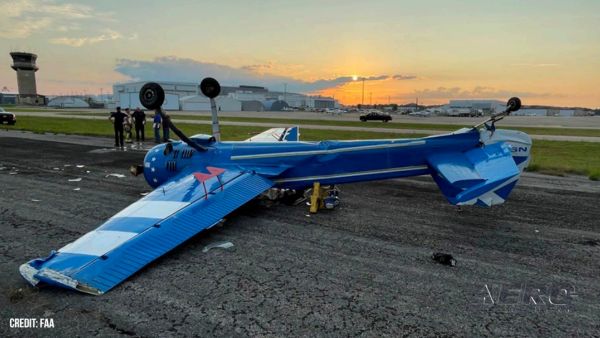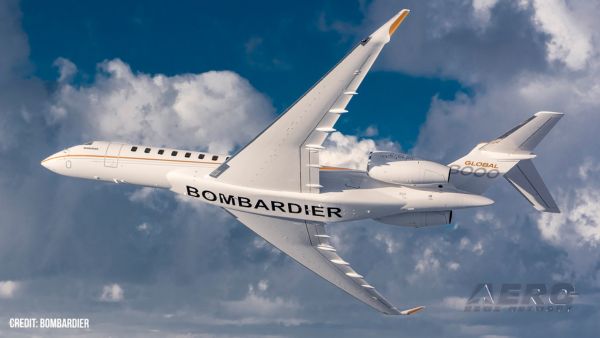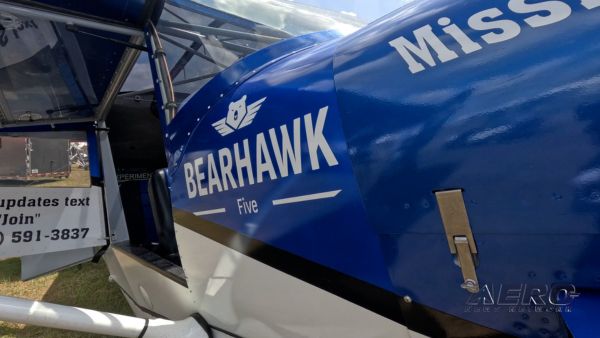Everyone, And No One
Aero-News Analysis By ANN Associate Editor Rob Finfrock
 In a press conference
Thursday held, surely not by coincidence, at a Dallas-Fort Worth
International Airport hotel, Dallas Mayor Laura Miller and Fort
Worth Mayor Mike Moncrief jointly announced an agreement that could
potentially bring an end to the 26-year battle over the Wright
Amendment, which limits flights from neighboring airport Dallas
Love Field.
In a press conference
Thursday held, surely not by coincidence, at a Dallas-Fort Worth
International Airport hotel, Dallas Mayor Laura Miller and Fort
Worth Mayor Mike Moncrief jointly announced an agreement that could
potentially bring an end to the 26-year battle over the Wright
Amendment, which limits flights from neighboring airport Dallas
Love Field.
The deal -- which must be approved by the respective city
councils, and then by Congress -- represents an amicable agreement
by the cities of Dallas and Fort Worth, American Airlines,
Southwest Airlines, and those carriers' respective home airports.
As with all compromises, the deal gave all parties in the Wright
Amendment battle something to cheer about... and each side lost a
little, too.
It was difficult finding naysayers at Thursday's conference.
"The traveling public -- 5.3 million people in the immediate
12-county area -- will see an immediate and dramatic increase in
airline competition, which typically results in lower fares and
more choices, which will in turn stimulate economic growth for our
region," Miller said.
The details of the deal are as follows, with ANN commentary
following:
-
The Wright Amendment still stands, for now... but all long-haul
flight restrictions would be lifted in 2014.
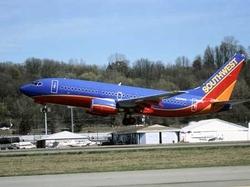 ANN Take:
Long-haul restrictions will be lifted eight years from the date the
deal is approved by Congress... which must occur by the end of this
year, or else the deal is void and all parties go back to square
one. Southwest, of course, had wanted the immediate lifting of such
restrictions... and executives with the airline initially balked at
the eight-year timeframe. Those comments were quieted by Thursday's
press conference, however... and realistically, Southwest benefits
from the allowance of through-ticketing (see next item) more than
it loses having to wait eight years for the Wright Amendment to,
finally, disappear.
ANN Take:
Long-haul restrictions will be lifted eight years from the date the
deal is approved by Congress... which must occur by the end of this
year, or else the deal is void and all parties go back to square
one. Southwest, of course, had wanted the immediate lifting of such
restrictions... and executives with the airline initially balked at
the eight-year timeframe. Those comments were quieted by Thursday's
press conference, however... and realistically, Southwest benefits
from the allowance of through-ticketing (see next item) more than
it loses having to wait eight years for the Wright Amendment to,
finally, disappear.
The eight-year hold also gives American Airlines time to
structure a plan to compete with a non-restricted Southwest, and
allows plenty of time for needed improvements to be made to
Love.
-
Southwest will be allowed to begin immediate through-ticketing
at Love Field
ANN Take: This is the Big One, Southwest's
chief victory in this agreement... perhaps even more than the
eventual repeal of Wright. Through ticketing -- meaning passengers
may fly anywhere in the country, on the same ticket (even the same
plane) as long as the aircraft stops first in a Wright Amendment
state -- allows Southwest to compete on the same playing field as
most other airlines when it comes to medium-distance routes, that
typically go through a hub airport, anyway. While the airline does
give up some ground to American in this regard, through-ticketing
does give Southwest equal footing with other airlines operating
from DFW... most notably Northwest and AirTran, whose hubs are in
other cities... and most Southwest customers will likely appreciate
the added convenience of only needing one ticket more than they'll
grumble about a short stopover in a neighboring state. The
availability of through ticketing should also, in theory, result in
lower fares... as a result of both lower ticket costs, as well as
greater competition for American and other airlines flying from
DFW.
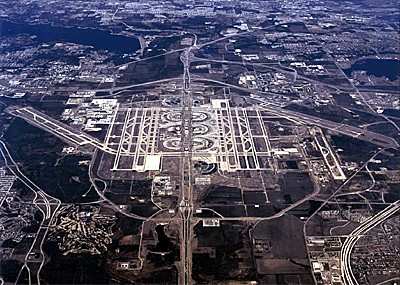
Some more potential big winners in through ticketing are
airports in neighboring states, that will likely see an increase in
the number of Southwest planes as the concept takes off among
Southwest's passengers. Albuquerque, in particular, could see a
jump in business, as it represents Southwest's main Wright
Amendment gateway to the West Coast. Kansas City, St. Louis, and
Little Rock could also see big gains; conversely, Houston's crowded
Hobby Airport could see an (arguably much-needed) reduction in
flights, as former "Wright flights" are more economically routed
through other cities.
-
Love Field's gates would be capped at 20 beginning in 2010,
giving Southwest 16 gates and two gates each to American Airlines
and Continental Airlines. The remaining 12 gates would be
demolished or modified so they can't be used, and airlines cannot
split gates.
ANN Take: Dallas is currently negotiating to
purchase the old, mothballed Legend Terminal, which represents the
majority of gates that would be closed under this arrangement.
Dallas plans to demolish the terminal... but these gates aren't
being used anyway. The Legend terminal -- which, frankly, is far
nicer than Love's main terminal -- was built to accommodate the old
Legend Airlines' DC-9s... and is not useable by Southwest's 737s.
Southwest also has unused gates in the airport's north concourse
that would likely be shuttered, and converted into other uses.

Southwest currently maintains 14 gates at Love Field... and
would likely shuffle flights to handle increased traffic for
through-ticket flights, which should mean 16 is a serviceable
number, at least for now.
The winners here? Neighbors around Love Field -- especially
those in the Park Cities -- many of whom had expressed fear that
more flights from Love Field would mean more noise and pollution.
This is the primary concession to those concerns in this
agreement.
-
American, which gives up one gate at Love under this plan,
would not be forced to leave the smaller airport.
ANN Take: They will anyway, and in record time.
With this agreement in place, American no longer has a reason to
maintain a presence at Love Field; better the airline withdraw its
gates and use those planes on more profitable routes out of DFW. It
is no secret that American's Love Field operations have been money
losers for the airline; our sources generally agree that this
scenario gives American an easy way to leave Love.

-
The compromise includes $150-200 million in upgrades to Love
Field, to be funded by increasing landing fees at the airport.
ANN Take: The proposed increases are steep --
from a current 55 cents per 1,000 pounds landing weight, up to a
maximum of $3 -- but those fees would still be less than comparable
charges at DFW, and are not likely to be met with much criticism.
The improvements to Love Field mentioned at the press conference
would include a much-needed remodeling the airport's 1950s-vintage
terminal. A separate fee, levied on passengers, would go towards
building a spur line from the airport to the Trinity River Express
light rail line that runs south of the field.
-
A voluntary noise curfew would be implemented at Love Field
that would prevent scheduled take-offs or landings between 11 pm
and 6 am.
ANN Take: Such a de facto curfew more or less
already exists at Love, as Southwest only shows two flights (one
from Albuquerque, the other from Houston) that arrive after 11 (in
practice, the Houston flight typically arrives later than that,
closer to midnight) and no scheduled departures after 11:30.
It is unclear how the restrictions would impact the primary
users of Love Field in the overnight hours -- regional freight
haulers, and larger operations such as DHL. If the noise
restriction sticks, those operations could eventually move to
surrounding airports, such as Addison or Executive (nee
Redbird).
-
Both Dallas and Fort Worth agree to oppose new commercial
service at any other airport within an 80-mile radius of Love Field
(except DFW, of course) for the remaining eight years the Wright
Amendment is still in effect. And, Southwest would be forced to
give up gates at Love Field if it chose to operate out of other
local airports.
 ANN Take: Fort
Worth has repeatedly tried -- and failed -- to lure new carriers to
the Alliance and Meacham airports. It's a non issue, especially
with room still available at DFW. As far as Southwest wanting to
operate from another local airport... the carrier has little reason
to do so, unless it runs out of room at Love Field. But let's
assume that happens, sometime between 2014 and 2025, when this
stipulation expires. It is likely that by the time Southwest
outgrows Love Field, it will be ready for another airport,
anyway... and who knows what the political and economic climate
will be then? Southwest is hedging its bets here... and we know the
carrier's successful track record when it comes to hedging...
ANN Take: Fort
Worth has repeatedly tried -- and failed -- to lure new carriers to
the Alliance and Meacham airports. It's a non issue, especially
with room still available at DFW. As far as Southwest wanting to
operate from another local airport... the carrier has little reason
to do so, unless it runs out of room at Love Field. But let's
assume that happens, sometime between 2014 and 2025, when this
stipulation expires. It is likely that by the time Southwest
outgrows Love Field, it will be ready for another airport,
anyway... and who knows what the political and economic climate
will be then? Southwest is hedging its bets here... and we know the
carrier's successful track record when it comes to hedging...
-
If Congress passes legislation that is not in line with the
agreement -- and, if Southwest then starts nonstop long-haul
service to or from Love Field -- the airline would then voluntarily
give up control of eight gates at the airport.
ANN Take: This presents another interesting
scenario, as Southwest could be penalized for any Congressional
ruling on the Wright Amendment that, just one week ago, the carrier
would have welcomed. Southwest has stated it could not viably
operate its base of operations with only eight gates at Love.
But... what if Southwest were to make good on its earlier
rumblings, and move its headquarters from Dallas? It could base
long haul operations from that location... while also using eight
gates for long haul service out of Love Field. A promise to keep
its headquarters at DAL was not part of Southwest's terms in this
agreement -- only that it would abide by its terms.
Having said that, Southwest has pledged to support the
agreement, along with the other players in this battle. While there
has been some speculation that Southwest may shrewdly attempt to
press its own agenda with lawmakers while publicly supporting the
tentative agreement... truth is, there isn't a really smart reason
to do so, unless Southwest still has a few more cards up its
sleeves.
Which it just might...
-
International commercial service from Love Field remains
prohibited
 ANN Take: This
is a concession to American and DFW... but Southwest has done just
fine flying only domestic routes, and its codeshare agreement with
ATA gives the airline access to Hawaii. Southwest could always
begin international service to Mexico from ABQ, if it were so
inclined. This is a nonstarter.
ANN Take: This
is a concession to American and DFW... but Southwest has done just
fine flying only domestic routes, and its codeshare agreement with
ATA gives the airline access to Hawaii. Southwest could always
begin international service to Mexico from ABQ, if it were so
inclined. This is a nonstarter.
So, Who Won?
As with all great compromises, the answer is: everyone, and no
one.
The positives -- American gets to keep Wright for another eight
years; DFW -- and Fort Worth -- maintains the upper hand for
travelers looking to fly nonstop to distant destinations. The city
of Dallas gets to keep one of its biggest tax-paying customers
happy; and, at long last, Southwest can see a light at the end of
the Wright tunnel.
As far as negatives go -- American loses much of its protection
from the Wright Amendment immediately, with through ticketing at
Love... and the Wright Amendment shield disappears completely in
eight years. DFW airport still remains attractive to long distance
flyers in the metroplex, as well as customers in Fort Worth... but
a more convenient Love Field will likely take customers from the
larger airport. Dallas will have to foot the bill for demolishing
the Legend Terminal... and still risks eventually losing Southwest
at Love Field, although that is probably a longshot. And Southwest
still has to live with the Wright Amendment for another eight
years.

The true winners? Well, to hear the city leaders and airline
CEOs tell it, the answer is: customers in North Texas, who now have
two viable options for a large amount of their air travel
needs.
What is the next step?
The measure must pass approval with the Dallas City Council on
June 28, and Fort Worth votes on the measure July 11. Lawmakers in
North Texas must also voice their support for the agreement... and
then persuade their colleagues outside of Texas to support it.
The Dallas Morning News reports one holdout on the original
agreement -- Senator Kay Bailey Hutchison -- plans to draft
legislation based on the agreement to present to legislators. From
then on, lawmakers are under the wire to pass the agreement by
December 31 of this year... or else the agreement is void.
And then we start all over again.
 Aero-News: Quote of the Day (05.25.25)
Aero-News: Quote of the Day (05.25.25) Classic Aero-TV: Efficient Versatility -- NASA GL-10 Greased Lightning
Classic Aero-TV: Efficient Versatility -- NASA GL-10 Greased Lightning NTSB Prelim: Cessna 525
NTSB Prelim: Cessna 525 Klyde Morris (05.23.25)
Klyde Morris (05.23.25) Airborne-NextGen 05.20.25: Drone Regs, Zero-Emission Cargo, Door-Dash Drone
Airborne-NextGen 05.20.25: Drone Regs, Zero-Emission Cargo, Door-Dash Drone
 In a press conference
Thursday held, surely not by coincidence, at a Dallas-Fort Worth
International Airport hotel, Dallas Mayor Laura Miller and Fort
Worth Mayor Mike Moncrief jointly announced an agreement that could
potentially bring an end to the 26-year battle over the Wright
Amendment, which limits flights from neighboring airport Dallas
Love Field.
In a press conference
Thursday held, surely not by coincidence, at a Dallas-Fort Worth
International Airport hotel, Dallas Mayor Laura Miller and Fort
Worth Mayor Mike Moncrief jointly announced an agreement that could
potentially bring an end to the 26-year battle over the Wright
Amendment, which limits flights from neighboring airport Dallas
Love Field.






